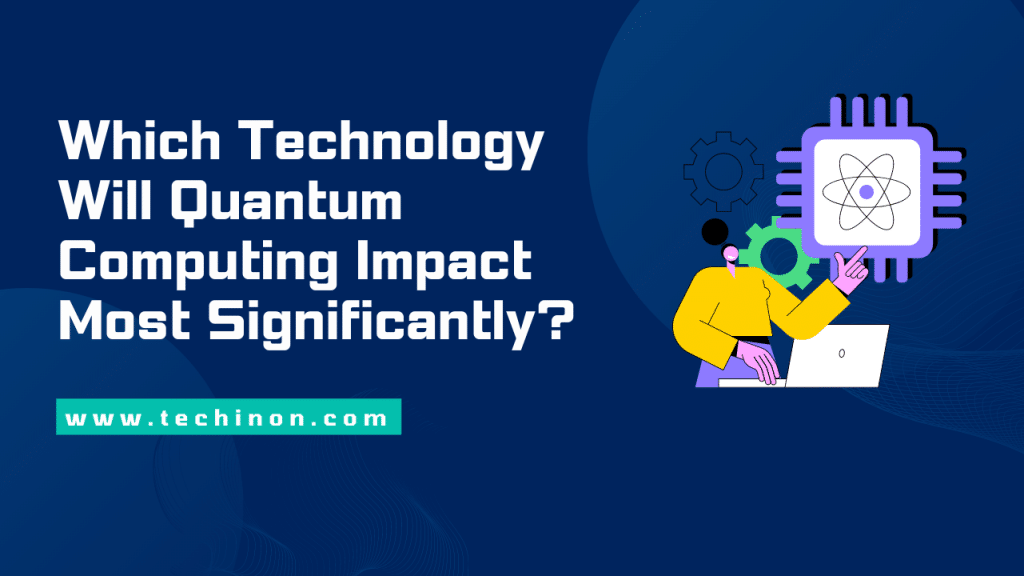Introduction
Imagine a world where problems that currently take centuries for classical computers to solve are cracked in mere seconds. This isn’t science fiction; it’s the astounding promise of quantum computing. Quantum computing is poised to reshape our technological landscape, propelling us into a new era of computational power. Among the various domains that quantum computing is set to impact significantly, several key technologies stand out as prime candidates for a quantum revolution. From quantum cryptography to quantum machine learning, the possibilities are exhilarating. So, get ready to know about which technology will quantum computing impact most significantly?
Quantum Supremacy
Quantum Algorithms: One of the most thrilling aspects of quantum computing is the potential to develop algorithms that outperform their classical counterparts exponentially. Quantum algorithms harness the unique properties of quantum bits, or qubits, to perform calculations in parallel, solving complex problems with incredible efficiency. This capability will be revolutionary across diverse fields, from cryptography to optimization and simulations.
Quantum Machine Learning: The fusion of quantum computing and machine learning opens doors to solving intricate problems that were previously infeasible. Quantum computers can analyze massive datasets and extract meaningful insights at unparalleled speeds, driving advancements in areas like drug discovery, financial modeling, and artificial intelligence.
Quantum Cryptography and Encryption
Quantum Cryptography: The advent of quantum computers challenges the security landscape. However, quantum cryptography offers a solution. Quantum key distribution leverages the principles of quantum mechanics to create unbreakable encryption keys. This technology promises an era of ultra-secure communication, safeguarding sensitive data against even the most advanced attacks.
Quantum Encryption: Quantum encryption takes data security to a whole new level. Unlike classical encryption methods vulnerable to brute-force attacks, quantum encryption relies on the inherent randomness of quantum states. As quantum computers advance, so too will the encryption methods, ensuring data remains secure in an increasingly digital world.
Shaping Tomorrow
Quantum Communication: Quantum entanglement, famously dubbed “spooky action at a distance” by Einstein, is at the heart of quantum communication. It enables the creation of entangled qubits that share information instantaneously, regardless of distance. This phenomenon will revolutionize secure communication, making intercepting messages practically impossible.
Quantum Internet: The concept of a quantum internet takes communication to a new dimension. Imagine ultra-fast, secure, and reliable connections between devices across the globe, all protected by the principles of quantum mechanics. With quantum repeaters and quantum routers, the quantum internet is poised to redefine the way we connect and share information.
Reshaping Industries
Finance and Optimization: Quantum computing’s ability to solve complex optimization problems will revolutionize industries reliant on efficient resource allocation. Financial institutions can optimize trading strategies, risk assessments, and portfolio management, resulting in more accurate predictions and better decision-making.
Healthcare and Drug Discovery: Quantum computing’s potential in drug discovery is immense. Its computational power can model molecular interactions with unprecedented accuracy, accelerating the development of new medications and therapies. This technology could reshape the pharmaceutical industry and enhance patient care.
Supply Chain and Logistics: Quantum computing’s optimization prowess extends to supply chain management. It can streamline routes, minimize transportation costs, and enhance inventory management. This efficiency boost will ripple across industries, reducing waste and improving sustainability.
Energy and Materials Science: Quantum simulations are poised to transform energy research and materials science. They can model complex molecular systems, leading to breakthroughs in renewable energy, efficient batteries, and novel materials with extraordinary properties.
Quantum Computing and Artificial Intelligence
Quantum Machine Learning: Quantum computing and artificial intelligence (AI) are poised to become inseparable allies. Quantum machine learning harnesses the immense processing power of quantum computers to improve AI algorithms. These algorithms can sift through massive datasets, identifying patterns and insights at an astonishing rate. This synergy between quantum computing and AI holds the potential to unlock breakthroughs in fields like natural language processing, image recognition, and autonomous systems.
Quantum AI: Quantum AI takes this collaboration to the next level. Quantum computers can explore multiple possibilities simultaneously, a trait that aligns well with AI’s need to analyze numerous scenarios. This marriage of quantum computing and AI could lead to AI systems that are more creative, capable of solving complex problems, and making predictions that were previously deemed impossible.
Quantum Computing and Quantum Materials
Quantum Simulations: Quantum computers excel at simulating quantum systems, which are notoriously challenging for classical computers to model accurately. This capability will significantly impact fields like quantum chemistry, materials science, and even fundamental physics research. Researchers can simulate the behavior of molecules, materials, and particles with a level of precision that was previously unattainable. This not only accelerates scientific discovery but also paves the way for designing new materials with tailored properties.
Quantum Materials: Quantum computing’s influence extends beyond just the computational realm. Quantum materials, characterized by their unique quantum mechanical properties, are set to transform electronics, energy storage, and more. Quantum computers can aid in designing and optimizing these materials, revolutionizing industries like electronics, renewable energy, and even space exploration.
Quantum Computing and Energy Research
Renewable Energy Optimization: Quantum computing’s exceptional optimization capabilities hold the potential to revolutionize renewable energy technologies. By accurately modeling and optimizing complex systems, quantum computers can enhance the efficiency of solar cells, wind turbines, and energy storage systems. This will contribute to a cleaner, more sustainable energy future.
Fusion Energy Simulation: The quest for practical fusion energy has long been a scientific challenge. Quantum computers can simulate the behavior of plasma in fusion reactors, leading to a deeper understanding of plasma physics and potentially accelerating the development of viable fusion energy solutions.
Quantum Computing and Quantum Sensors
Quantum Sensing: Quantum sensors leverage the unique properties of quantum states to achieve unprecedented levels of precision. Quantum computing can aid in optimizing these sensors, leading to applications in fields such as navigation, medical imaging, and environmental monitoring. These ultra-sensitive sensors could enable breakthroughs in detecting minute changes in gravitational fields, electromagnetic radiation, and chemical compositions.
Frequently Asked Questions
1. How will quantum computing affect cryptography?
Quantum computing poses a threat to classical cryptographic methods. However, quantum cryptography offers solutions through unbreakable encryption keys and quantum key distribution.
2. Can quantum computing revolutionize drug discovery?
Absolutely. Quantum computing’s computational power can model molecular interactions, drastically speeding up drug discovery and revolutionizing the pharmaceutical industry.
3. What industries will be most disrupted by quantum computing?
Industries like finance, healthcare, supply chain management, and materials science are poised for significant disruption due to quantum computing’s optimization and simulation capabilities.
4. How might quantum computing impact weather forecasting?
Quantum computing’s immense computational power could enhance weather simulations, enabling more accurate and timely forecasts for better disaster preparedness.
5. What challenges does quantum computing pose for cybersecurity?
Quantum computing’s potential to break classical encryption methods poses challenges for data security. However, quantum cryptography offers solutions for secure communication.
Also Read: Which Technology is Making Quantum Computing Easier to Access and Adopt?
Conclusion
In the grand tapestry of technological evolution, quantum computing stands out as a star player, poised to transform our world in ways we’re only beginning to comprehend. From unbreakable encryption to unprecedented computational power, the possibilities seem boundless. The impact of quantum computing on diverse fields such as cryptography, machine learning, communication, materials science, and more is a testament to its versatility and potential.
To sum it up, this article has shed light on various aspects of “Which Technology Will Quantum Computing Impact Most Significantly?,” providing valuable insights and answering your most pressing questions.

